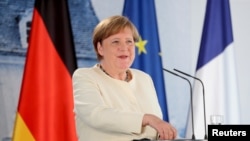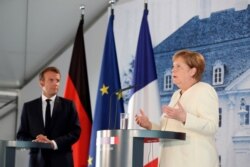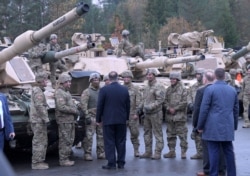The European Union’s most powerful member, Germany, takes over the bloc’s rotating presidency in July amid a raft of challenges — from COVID-19 and the economic devastation it has wrought, to Brexit, trade with China and tensions with the United States.
Germany’s presidency comes as its leader, Angela Merkel — the European Union’s longest serving current head of state — is expected to leave office next year. Both she and the bloc have a long list of challenges.
On the EU’s immediate agenda is overcoming differences to push through an 843 billion-dollar coronavirus recovery fund, aimed at boosting a so-called green economic reboot. Then there is getting agreement on the EU’s next multi-year budget, with a proposed price tag of more than a trillion dollars.
Meeting Monday with France’s President Emmanuel Macron in Mesenberg, Germany, Merkel said she hoped the 27-member bloc would strike a deal on both at a July summit.
The Germany presidency comes as Merkel is riding a crest of popularity, partly over what some see as her successful handling of the coronavirus pandemic. While Germany often sides with more frugal bloc members who are reluctant to offer large non-repayable grants, Merkel teamed up with Macron to push for a massive coronavirus recovery package.
The EU and Britain have also intensified negotiations aimed to define their post-Brexit relationship, with London eager to wrap things up speedily.
John Springford is deputy director of the Centre for European Reform research institute in London.
“Now, I think, there’s a realization that she wants to have been a chancellor that has made Europe stronger, and so they’re kind of a happy marriage of interests going on between her and Macron,” he said.
Sebastien Maillard, head of the Jacques Delors Institute research organization in Paris agrees Merkel is thinking about her legacy.
‘It’s really a time for her to make history. So this presidency surely will make a difference compared to previous ones," he said.
But making a difference does not promise to be easy. Reuters reports Germany wants more reciprocity with China, following complaints by European companies of an uneven playing field when it comes to market access.
Tensions between the EU and the United States have also grown under the Trump administration, which plans to withdraw thousands of U.S. troops from Germany.
“I think there is a strong desire to have some strong relationship because we know we share many common values, and there is much for both economies to share together, but to really be treated on even terms and for the US to consider the EU as a whole — not to try to divide us,” he said.
But analysts like Daniel Gros are skeptical about just how far Germany can go as European Council president.
“The presidency of a big country cannot achieve a lot. Because if it tries to push its own priorities, the other countries will react allergically,” says Gros who directs the Center for European Policy Studies in Brussels.
What is clear is there is plenty of work ahead for Berlin and for Brussels in the months ahead.







